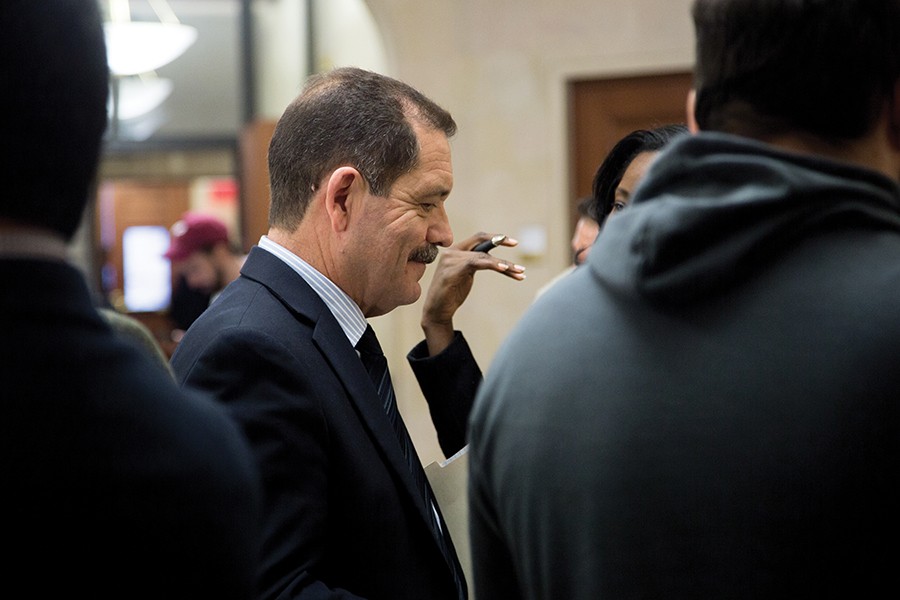Jesus “Chuy” Garcia speaks at Northwestern about Chicago politics
Zack Laurence/The Daily Northwestern
Former mayoral candidate Jesus “Chuy” Garcia speaks with attendees of his Tuesday talk on Chicago politics, his mayoral run and and issues confronting minority communities. The Mexico native and career Chicago-area politician lost the Chicago mayoral election in a runoff with incumbent Rahm Emanuel (Communication ’85) last spring.
February 24, 2016
One night in October 2014, Jesus “Chuy” Garcia paced the halls of his house, contemplating the seemingly unwinnable prospect of running for mayor of Chicago. But when his wife learned what was troubling her husband, the first words out of her mouth sealed Garcia’s decision.
“Hell yeah,” she said. “Let’s do this.”
In the wake of his defeat in a runoff election to incumbent Mayor Rahm Emanuel last spring, Garcia visited Northwestern on Tuesday to share his concerns about the current political state of Chicago and Illinois, the toxic relationship between money and politics, and various issues confronting minority communities.
The Mexico native and career Chicago-area politician said he overcame tremendous odds, including what he said was a $30 million to $5 million to $7 million deficit in campaign fundraising, to force a runoff with Emanuel and attract the eyes of the whole country to the election.
“(The election) was good for Chicago and good for democracy,” Garcia said to a group of about 50 people gathered inside Harris Hall. “But the city remains in a deep morass of problems without a clear path to sustainability.”
Unfortunately, he said, the national spotlight has yet to leave Chicago in the time since the election due to the Laquan McDonald shooting incident, the Illinois government’s inability to pass a state budget and other issues. Garcia criticized both Emanuel and Illinois Gov. Bruce Rauner for valuing money over the good of the people.
Responding to an audience member’s question about tax increment financing, a funding tool intended to promote urban development, Garcia said billions of dollars generated by the policy have been used as “a kitty of corporate welfare for those … connected to the mayor.”
He additionally denounced Rauner’s “irresponsible … shock therapy” approach to the governorship and the state’s ongoing budget impasse.
Garcia also spoke about the need for a continued increase in political activism within the Latino community. He said many blacks and Latinos elected to local offices find raising money from their often poor districts difficult and, therefore, turn to lobbyists for financial reasons, compromising the morality of such officials’ voting habits and reducing the representation of minority populations.
However, he told The Daily he was encouraged by projections that Latino voter turnout will increase 17 percent in the 2016 presidential election — in which Garcia supports Democratic candidate Bernie Sanders — over the 2012 turnout.
“It’s especially interesting, (since) he has been on the front lines of progressive politics for a long time, to hear his reactions to recent developments in progressive politics today,” said Weinberg senior Samuel Niiro, who attended the event.
Another Weinberg student, junior Kevin Russell, said he came to learn more about local Chicago politics, a subject he said he previously knew little about. He said after hearing Garcia’s viewpoints, he wished the former candidate had been elected last year.
By sharing such unfiltered opinions with the group of largely NU students, Garcia hoped to further what he sees as an exciting recent spike in political interest among the millennial generation, he said.
“Their input can make electoral races more relevant, more meaningful and more fun for everyone when they participate, asking the types of questions that they ask,” Garcia told The Daily, mentioning marijuana legalization and gay marriage as two subjects that young people have recently boosted into the political conversation. “I’m hoping that they’ll get hooked into understanding that they can be major force in deciding who office-holders will be.”
Email: [email protected]
Twitter: @benpope111


